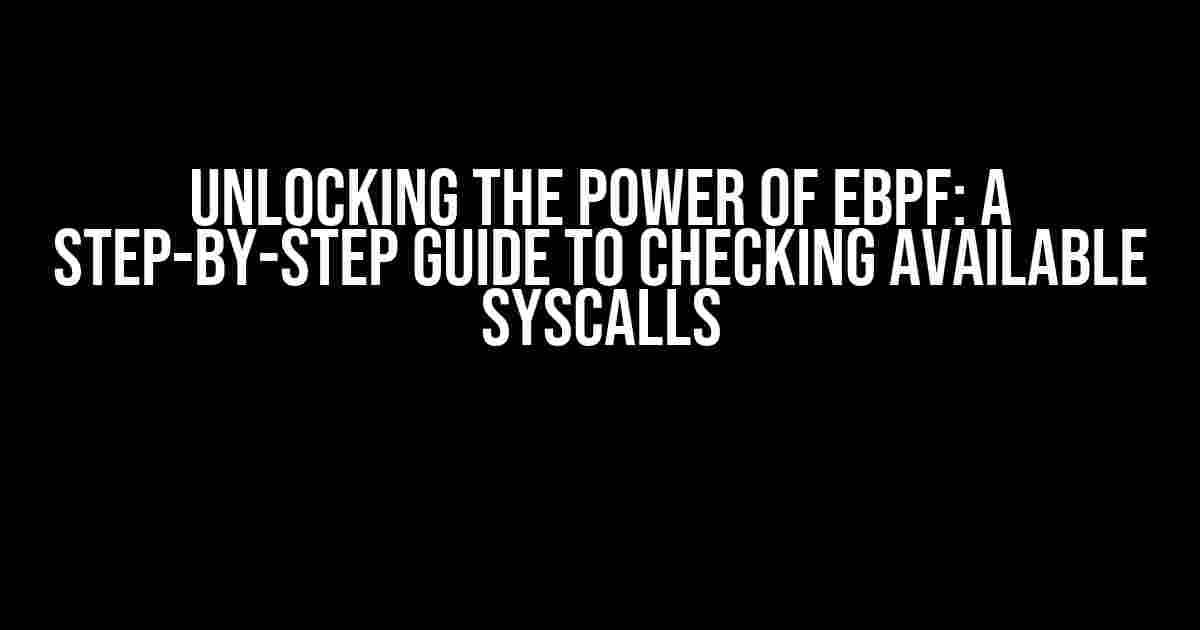Are you ready to tap into the world of eBPF (extended Berkeley Packet Filter) and unlock the secrets of syscall exploration? Look no further! In this comprehensive guide, we’ll take you on a journey to discover how to check the syscalls available using eBPF. Buckle up, and let’s dive in!
What is eBPF, and Why Do I Need It?
eBPF is a revolutionary technology that allows you to run sandboxed, in-kernel programs, giving you unparalleled control over system interactions. By leveraging eBPF, you can monitor, analyze, and even transform system behavior without compromising performance or security. But before we dive into the world of eBPF, let’s answer the million-dollar question: why do you need it?
- Enhanced security**: eBPF enables you to monitor and analyze system calls, helping you detect and respond to security threats in real-time.
- Improved performance**: By optimizing system calls, eBPF can significantly boost system performance, reducing latency and increasing throughput.
- Customizability**: eBPF allows you to write custom programs that can manipulate and transform system behavior, giving you the freedom to tailor your system to your needs.
The Quest for Available Syscalls: Getting Started
Now that you’re convinced of the benefits of eBPF, it’s time to start exploring the world of syscalls. But before we begin, make sure you have the following tools installed:
- eBPF-enabled kernel**: Ensure your kernel supports eBPF. You can check by running
uname -rand looking for thebpfkeyword. - BPF Compiler Collection (BCC)**: Install BCC, a collection of tools for working with eBPF programs.
- A Linux system**: You’ll need a Linux system to run the examples and exercises in this guide.
Method 1: Using the bpftrace Command
One of the easiest ways to check available syscalls is by using the bpftrace command-line tool. This powerful tool allows you to write eBPF programs in a high-level language, making it perfect for syscall exploration.
$ bpftrace -l
This command will list all available syscalls, along with their corresponding syscall numbers. You can use this information to create custom eBPF programs that target specific syscalls.
Example: Monitoring the open Syscall
Let’s create a simple eBPF program that monitors the open syscall:
$ bpftrace -e 'tracepoint:syscalls:sys_enter_open { printf("open syscall triggered\n"); }'
This program uses the bpftrace language to define a tracepoint that captures the sys_enter_open event. When the open syscall is triggered, the program prints a message to the console.
Method 2: Using the bpf Command
Another way to check available syscalls is by using the bpf command. This tool allows you to load and attach eBPF programs to specific syscalls.
$ bpf program list
This command will list all available syscall programs, including their corresponding syscall numbers and program IDs.
Example: Attaching to the read Syscall
Let’s create an eBPF program that attaches to the read syscall:
$ bpf program load read_prog.o /sys/kernel/bpf/read_prog
$ bpf program attach 12345 read /sys/kernel/bpf/read_prog
In this example, we load the read_prog eBPF program and attach it to the read syscall using the bpf command. The program will now capture and process read syscall events.
Method 3: Using the sysctl Command
The sysctl command provides a way to query and modify kernel parameters, including those related to syscalls.
$ sysctl -a | grep syscall
This command will list all available syscall-related kernel parameters, including their current values.
Example: Monitoring Syscall Auditing
Let’s use sysctl to monitor syscall auditing:
$ sysctl -w kernel.sysctl_audit=1
In this example, we enable syscall auditing by setting the kernel.sysctl_audit parameter to 1. This will allow us to monitor and audit syscalls using tools like auditd.
Conclusion
Congratulations! You’ve successfully explored the world of eBPF and syscalls. With the methods outlined in this guide, you’re now equipped to check available syscalls and create custom eBPF programs that target specific syscalls.
Remember, eBPF is a powerful tool that requires careful handling. Make sure to test and validate your programs in a controlled environment before deploying them to production systems.
Additional Resources
Want to learn more about eBPF and syscalls? Check out these additional resources:
- The official eBPF documentation
- The BPF Compiler Collection (BCC) repository
- A comprehensive guide to eBPF fundamentals
| Syscall | Syscall Number | Description |
|---|---|---|
| open | 2 | Opens a file |
| read | 3 | Reads from a file |
| write | 4 | Writes to a file |
Happy syscall hunting, and remember to always keep your eBPF skills sharp!
Frequently Asked Question
Get ready to dive into the world of eBPF and explore the fascinating realm of system calls!
How can I check the available syscalls in my system?
You can use the `syscall` command with the `-l` option to list all available syscalls. This will display a comprehensive list of syscalls, along with their corresponding numbers. For example, run `syscall -l` in your terminal to get started!
What is the role of the `auditctl` command in checking syscalls?
The `auditctl` command is used to configure and manage the Linux Audit framework. You can use it to list all available syscalls and their corresponding audit event types. Run `auditctl -l` to get a detailed list of syscalls, their numbers, and audit event types. This is especially helpful when you need to track specific syscalls for auditing purposes.
Can I use `strace` to check syscalls?
Yes, you can! `strace` is a powerful tool for tracing system calls and signals. You can use it to list all syscalls made by a particular process or program. Run `strace -f
How can I check the syscalls available for a specific architecture?
You can use the `syscall` command with the `-A` option followed by the architecture name (e.g., `x86_64`, `arm`, etc.) to list the available syscalls for that specific architecture. For example, run `syscall -A x86_64 -l` to get the list of syscalls available for the x86_64 architecture.
Are there any online resources available to check syscalls?
Yes, there are several online resources available to check syscalls. One popular resource is the Linux Syscall Reference, which provides a comprehensive list of syscalls for various architectures. You can also check out the Linux Man Pages online, which offer detailed documentation on system calls and other Linux commands.


